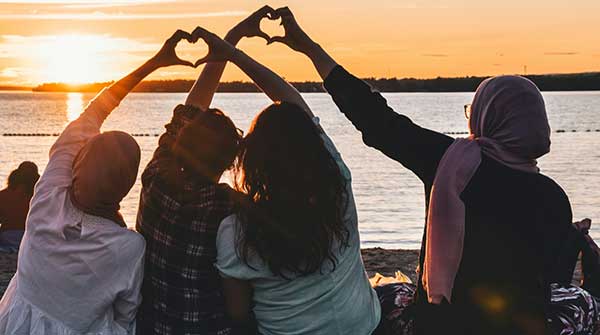What happens when we fail to see the humanity in our neighbour?
 While preaching in what is now Palestine, a Jewish rabbi named Jesus gave his listeners a lesson on maintaining their humanity. He explained that when we act rightly and kindly toward the most marginalized in our world, the poor, hungry, sick, condemned, and imprisoned, we are embracing the divine.
While preaching in what is now Palestine, a Jewish rabbi named Jesus gave his listeners a lesson on maintaining their humanity. He explained that when we act rightly and kindly toward the most marginalized in our world, the poor, hungry, sick, condemned, and imprisoned, we are embracing the divine.
By seeing the humanity in others and sharing the goodness in ourselves, we share our common humanity; we become more humane and even more human.
What happens to us when we fail to see the humanity in our neighbour? Can we do so without losing our own humanity? It does not seem possible. Historically, the most segregated societies are also the most violent and cruel. We saw this in Nazi Germany and Apartheid South Africa, for example. We also saw it in the actions of colonizers all around the world.
Each of us instinctively knows that we all have equal dignity, and when we mistreat our neighbour, it seems to provoke guilt and fear deep within us. We ask, “What if someone finds out that I’m just like the person being persecuted? What do I have to do to keep them from finding out?” We fight to protect what we think we have and become less and less humane.
When we recognize our oneness with our oppressed neighbour, we realize we have nothing to lose and, therefore, nothing to fear. We are all different, with strengths, weaknesses and struggles, yet we are all human. Others may criticize and even condemn us when we support those labelled as undesirable, but we are at peace because we know we are doing the right thing.
I have yet to meet someone who regrets treating another person with humanity. We may be taken advantage of from time to time, but that doesn’t have the power to take away our goodness.
Is the world finally beginning to learn the lesson of our humanity? It is not only Arabs who identify with the suffering of Palestinians. In fact, it is difficult to find a country in the global south or a country elsewhere that has been colonized that does not identify with the struggle of Palestinians.
The governments of colonizing countries like Germany, France, the United Kingdom, the United States, and Canada are losing touch with their populations. Every effort to silence voices crying out for the respect of Palestinians is failing. Ordinary people recognize that they have no choice but to speak out despite the risk because the price of remaining silent is the loss of one’s humanity.
One also needs to be concerned about the negative impact the assault on Palestinians is having on Israeli society. While the vast majority of Israeli citizens support their country’s aggressions, Prime Minister Benjamin Netanyahu is very unpopular, and there are near-constant protests. We are also seeing videos posted online by ordinary Israeli soldiers that are so egregious they are being used as evidence in the current genocide trial at the International Court of Justice.
It is said that the arc of the moral universe bends toward justice. Perhaps that is what we are experiencing now. Billions of people around the world are longing to see a ceasefire and a just solution to the tensions between Israel and Palestine. Our humanity appears to be awakening. After Gaza, will we still be able to ignore the carnage in Sudan or the ongoing sacrifice of human life in the Democratic Republic of the Congo to feed our lust for technology?
Bishop Desmond Tutu survived the oppression of apartheid in his native South Africa and became one of the leaders in his country’s march to freedom and equality. He was also an advocate for human rights elsewhere. He passed away in 2021, yet his words regarding the Israel-Palestine conflict now seem prophetic: “Gaza is going to test who believes in the worth of human beings.”
Gerry Chidiac specializes in languages, genocide studies and works with at-risk students. He is the recipient of an award from the Vancouver Holocaust Education Centre for excellence in teaching about the Holocaust.
For interview requests, click here.
The opinions expressed by our columnists and contributors are theirs alone and do not inherently or expressly reflect the views of our publication.
© Troy Media
Troy Media is an editorial content provider to media outlets and its own hosted community news outlets across Canada.

